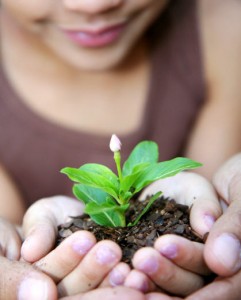Many years ago there was an old farmer. No one knew quite how old, but he was described as ancient. He was a typical farmer by most accounts. Long white hair and beard, blue jean overalls with a red bandana in the back pocket, and an old straw hat that he use to wear. He would sometimes pluck and chew on one of the many pieces of straw that came from his hat as he went about his day on the farm.
One slightly odd thing about the farmer was that he had divided his farm into three separate plots. Not that this was odd, but the name he gave for each of the three sections was. He called the three divisions of his farm: the Mind, the Heart, and the Soul. And he erected large signs which he hand-painted as such and placed in the ground to label the distinct sections of land.
Another slightly odd behavior of the farmer was the nicknames he had given his seeds. He called his seeds: truth, beauty, love, compassion, charity, spirituality, reason, logic, and wisdom. He arranged these seeds in groups of three as he planted them in the land of his farm. He sowed truth, beauty, and love in the Heart section. He grew reason, logic, and wisdom in the Mind section. And he planted compassion, charity, and spirituality in the Soul section of this farm.
These were just nicknames for the seeds as they really were just plain old seeds. Potatoes, tomatoes, lettuce, cabbage, spinach, corn, and the like. The farmer, who had great imagination, liked the nicknames of the seeds and the sections of his farm. It would tickle his fancy to go about his day making up rhymes or songs to describe his planting. A rhyme he might say would go like this, “truth, beauty, and love, all seeds from above, any one of these, includes the other two, when I think of me, I also think of you.” This type of thing would make the farmer laugh out loud as he went about his day on the farm.
Now the farmer was a friendly sort even though he lived all alone. The only other farm nearby was miles down the road. On occasion a little girl, a golden-haired neighbor child would wander by and listen to the farmer sing as he planted and tended and harvested. The farmer was always nice. He would carry a bushel of his best yield to his neighbors down the road whenever his crops were ripe.
The neighbors would greet him well and give him tea and treat him with great respect. They would put out a picnic for the farmer, play him fiddle and banjo tunes, and tell him of their family stories. The little girls would dance and the boys would wrestle, but the grown-ups would sometimes ask, “don’t you ever get lonely up there, living all alone?” The farmer always had the same reply, “Why I ain’t all alone, I’m all one, it’s all in how you spell it.” This would make everyone laugh and then the day would be over and the farmer would head back for home.
Truth is the farmer never got lonely for he carried the memories of all the people he had ever met with him in his Imagine Nation. That’s what the old farmer called it. His memories of people. He figured he was made up of all these people that he had ever met. That’s the way he figured it. He liked it that way.
One spring day, after a particularly hard winter, the little neighbor girl went looking for the farmer, but he was nowhere to be found. His land was not planted and his signs had come to pieces. She went to the barn, but she could only find a few seeds in there. She took the seeds labeled truth, beauty, and love and went to the field to plant it. The H had fallen off of the Heart sign leaving the only sign left labeled eart. She did the best she could and planted the seeds in the dirt. She took out a marker and drew the H back on the sign, but there was only room for it left on the end. She then wrote a note for the farmer in case he returned. She wrote: “Heart seeds now planted eartH seeds.” The golden-haired little girl then skipped back down the road to her family’s home. Her name was Sunday.
©2013-2015 blindfish butler

